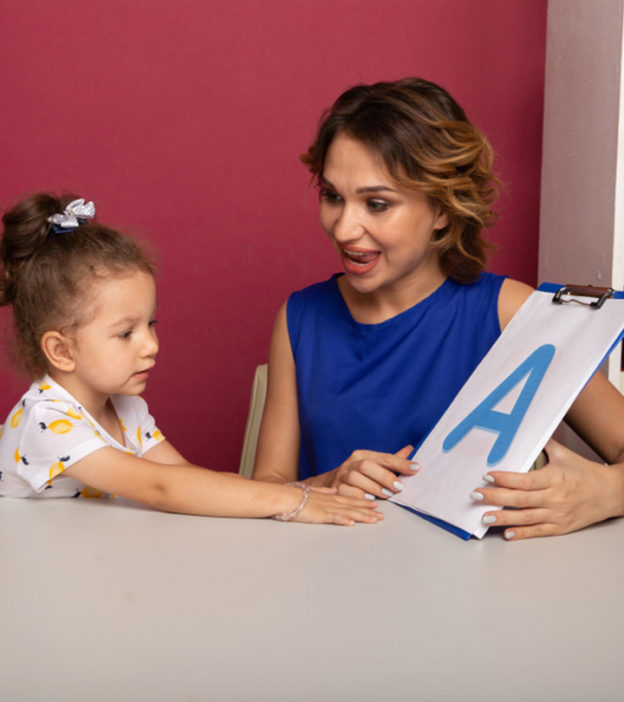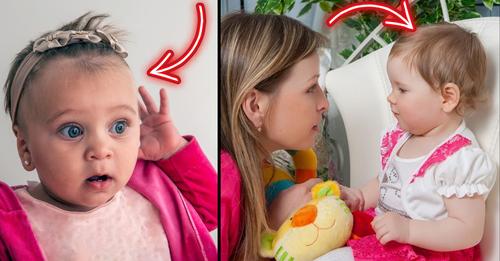
Ideally, a baby starts babbling from around 4 months of age, which develops into talking as they keep stacking more words in their vocabulary through the months. Between the age of 12 to 18 months, you can expect them to say meaningful yes and no, and call out mama and dada clearly. When your baby starts speaking is different for most babies. However, some babies don’t utter their first word for a long time. And as a natural reaction, parents can’t help but panic over it. Several reasons can result in speech delay, including premature birth and underweight of the child, but thankfully most of them can be solved quickly and effectively by professionals. Here are some signs that your child will be a later talker and how to identify them so you can help your little one at the earliest. Read on to know them all.
1. There Is A Delay In Language Building
It’s possible that your kid already knows a few words. However, if you find that they have problems stringing together more than two words, they may be suffering from a language delay. This is when you need to research how to help your child develop language skills and encourage them to speak to you more. The best way to help your child grasp language skills is to communicate with them more so they can learn and use the language fast.
2. They Might Have A Short Lingual Frenulum
This condition is also known as tongue-tied and makes it difficult for a person to talk since it restricts the range of motion of their tongue (2). This also prevents them from touching their top lip or palate with their tongue. If you notice this problem, you need to consult your pediatrician, who can suggest the medical treatments you can opt for to solve the condition.
3. They Don’t Blabber As A Baby
Take note of your baby’s babbling, paying careful attention to any noises that resemble “ba-ba-ba” or “ma-ma-ma.” One can begin to blabber even at the tender age of four to six months. If your baby is just not making these noises by the time they’re 7 or 8 months old, something may obstruct their speech. Talking to your pediatrician will help you solve this problem at the earliest.
4. They Are Underweight
Your child might be more likely to be a late talker if he or she was born with a low birth weight. Those born prematurely, before 37 weeks, may also take more time to develop their speaking skills. However, for most kids, once they catch up on their growth chart, the speech problem solves itself.
5. They Are Focussing On Something Else
Sometimes a child’s inability to communicate early may be because he or she is too busy with other things. For example, they might be preoccupied with mastering other talents, such as climbing. Also, you must consider that some kids are naturally shy and inclined to listen rather than speak. In such a case, making your child feel comfortable and talking to them will help them build strong communication skills.
6. They Have Oral-Motor Coordination Problems
Children lagging behind in their communication skills may also have difficulties with their oral motor skills (3). These manifest when there is dysfunction in the brain regions responsible for speaking. As a result, lip and tongue coordination may be more challenging for children.
7. You Have To Check For Signs Of Hearing Impairment
Hearing tests are done at regular intervals when your child goes for checkups, and if your child has hearing problems, there will be a delay in their speaking skills too. However, your pediatrician will be able to find solutions to it, and as soon as it is solved, your child will catch up on their hearing and talking skills.
If your child is a late talker, they may become a late bloomer once they enter school. Parents often worry about their child’s development, considering how late they can speak and communicate effectively with you. However, every child eventually learns to talk and share at their own pace, so there is nothing to stress about. Even though it may seem alarming when kids their age can communicate effectively and are quiet, as long as your pediatrician doesn’t seem worried, you shouldn’t be concerned about it too. So, what do you think is an effective way to help your child talk early on? Let us know in the comments section!






